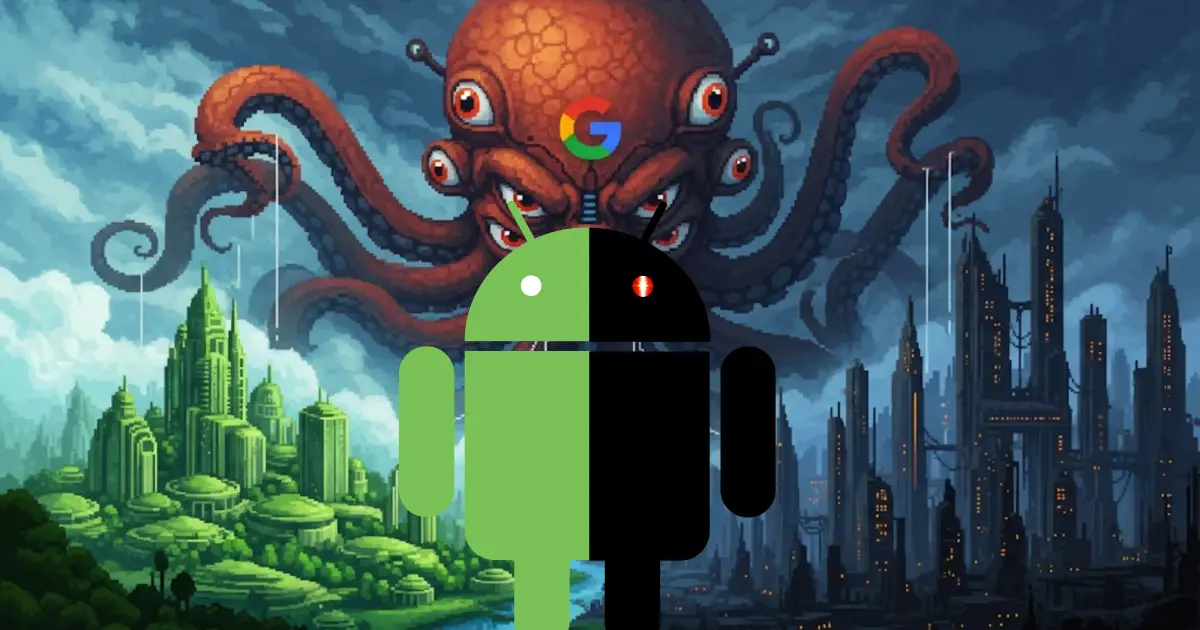Bitcoin
Are You Really In Control Of Your Phone?

Credit : bitcoinmagazine.com
Android, Google’s cell working system, announced on August 25 that will probably be requiring all app builders to confirm their id with the group earlier than their apps can run on “licensed android units.”
Whereas this may sound like a standard sense coverage by Google, this new customary is not only going to be utilized to apps downloaded from Google Play retailer, however all apps, even these “aspect loaded” — put in straight into units by side-stepping the Google Play retailer. Apps of the type could be discovered on-line in Github repositories or on undertaking web sites and put in on Android units straight by downloading the set up recordsdata (generally known as APKs).
What this implies is that, if there’s an software that Google doesn’t like, be it as a result of it doesn’t conform to its insurance policies, politics or financial incentives, they will merely hold you from working that software by yourself system. They’re locking down Android units from working purposes not with their purview. The ask? All builders, whether or not submitting their apps by the Play retailer or not, want to provide their private data to Google.
The choice begs the query, if you cannot run no matter app you need in your system with out the permission of Google, then is it actually your system? How would you reply if Home windows determined you would solely set up applications from the Microsoft app retailer?
The transfer has after all made information in tech and cyber safety media and triggered fairly a stir because it has profound penalties for the free and open internet. For years, Android has been touted as an open supply working system, and thru this technique has gained large distribution all through the world with customers in creating international locations the place Apple’s “walled backyard” mannequin and luxurious units are usually not inexpensive.
This new coverage will tighten up controls over purposes and its builders, and threatens the liberty to run no matter software program you want by yourself system in a really subversive and legalistic manner. Due to Google’s affect over the Android number of telephones, the implications of this coverage are more likely to be felt by nearly all of customers and units, all through the world.
Android justifies the coverage change with issues in regards to the cyber safety of their customers. Malicious apps side-loaded into units have led to “over 50 occasions extra malware” Android claims of their announcement weblog. As a measure of “accountability,” and with the council of assorted governments all through the world, Android has determined to take a “balanced method,” and the language couldn’t be extra Orwellian.
“Those that would surrender important Liberty, to buy just a little non permanent Security, deserve neither Liberty nor Security” – Benjamin Franklin
Put in less complicated phrases, Google is seeking to acquire the non-public data of software program builders, centralizing it in its knowledge facilities alongside that of all of its customers, with the intention to “shield” customers from hackers that Google can’t appear to cease right this moment within the first place.
In any case, if Google and Android might really hold private person knowledge safe within the first place, this might not be an issue, proper?
Google’s answer to person knowledge leaks is to gather extra person knowledge, sarcastically sufficient, on this case the info of builders who use the Android platform. A exceptional leap of logic, lazy and basically decadent, an indication that they’ve misplaced their edge and arguably actually forgotten their now scrubbed “don’t be evil” motto.
Info Needs To Be Free
The truth is that Google finds itself trapped by a dilemma arrange by the character of knowledge and the digital age, to cite the 90’s cypherpunk Steward Model, “data nearly needs to be free”.
Each hop that non-public knowledge, like your title, face, dwelling deal with or social safety quantity, makes all through the web is a chance for it to get copied and leaked. As your data strikes out of your telephone, to a server in your metropolis to a different server in a google datacenter, each hop will increase the probability that your knowledge will get hacked and finally ends up on the darkish internet on the market. A thorny drawback when person knowledge is the first enterprise mannequin of an enormous like Google who processes it and sells it to advertisers who in flip create focused advertisements.
We are able to measure the veracity of Model’s data precept by two fascinating statistics, which not too many individuals appear to speak about oddly sufficient. The primary is the absurd quantity of information hacks which have taken place within the final 20 years. For instance, the Equifax Data Breach in 2017, affected 147 million People, and the Nationwide Public Information Breach of 2024 affected over 200 million People resulting in leaked knowledge together with social safety numbers which doubtless ended up on the market in the dead of night internet.
Whereas legendary hacks like that of the Office of Personal Management of the U.S. authorities, compromised a considerable amount of the U.S. Authorities officers on the time, together with all the things from social safety numbers to medical information.
It’s not an exaggeration to say {that a} majority of People have had their knowledge hacked and leaked already, and there’s no simple technique to reverse that. How does one change their face, medical historical past or social safety quantity in spite of everything?
The second statistic, which nobody appears to connect with the primary, is the rise of id theft and fraud in america. Do you know that in 2012, 24 billion {dollars}’ price of id theft had been reported? Twice as a lot as all different types of theft mixed that very same 12 months. Enterprise Insider reported on the time from Bureau of Justice statistics that “id theft price People $24.7 billion in 2012, losses for household burglary, motor vehicle theft, and property theft totaled simply $14 billion.” Eight years later that quantity doubled, costing People $56 billion in losses in 2020. Each of those traits proceed to develop to at the present time. It might certainly already be too late for the previous id system which we nonetheless rely so closely on.
Generative AI provides gas to the fireplace, in some circumstances skilled in leaked person knowledge with examples of picture fashions capable of create high quality images of humans holding fake IDs. As AI continues to enhance, it’s more and more able to fooling people into pondering they’re speaking to a different human as effectively, moderately than a robotic, creating new assault vectors for id fraud and theft.
Nonetheless, Google insists that if we simply acquire a bit extra private person knowledge, perhaps then the issue will simply go away. Handy for an organization whose fundamental enterprise mannequin is the gathering and sale of such knowledge. Has every other company executed extra injury to civilian privateness than Google btw? Fb I suppose.
In Cryptography We Belief
Now to be truthful to the 2000’s Web2 tech giants the issue of safe id within the digital age shouldn’t be simple to resolve. The authorized buildings of our societies round id had been created lengthy earlier than the web emerged and moved all that knowledge to the cloud. The one actual answer to this drawback now is definitely cryptography, and its software to the belief that people construct of their relationships in the actual world, over time.
The 90s cypherpunks understood this, which is why they invented two necessary applied sciences, PGP and webs of belief.
PGP
PGP invented in 1991 by Phill Zimmerman, pioneered using uneven cryptography to resolve this elementary drawback of defending person knowledge privateness whereas additionally enabling safe person authentication, identification and safe communication.
How? It’s easy really, by utilizing cryptography in the same manner as Bitcoin does right this moment to safe over a trillion {dollars} of worth. You’ve gotten a safe ‘password’ and hold it as secret as potential, you don’t share it with anyone, and your apps use it fastidiously to unlock companies however the password by no means leaves your telephone. We are able to do that, it really works, there’s even customized made {hardware} to lock down exactly this type of data. The particular person or firm you wish to join with additionally creates a safe ‘password’, and with that password we every generate a public deal with or digital pseudonymous ID.
The corporate encrypts a message with their password and your public deal with and sends you a message. Effectively because of the magic of cryptography, you possibly can decrypt that message along with your password and the corporate’s public deal with. That’s all we have to safe the online. These public IDs do not need to disclose any details about you and you would have one for each model or id you’ve gotten on-line.
Webs Of Belief
However there’s additionally the query of repute, how are you aware that the corporate you are attempting to attach with is who they declare to be? In cyber safety that is known as a person within the center assault, the place a malicious third social gathering impersonates who you really want to hook up with.
The best way cypherpunks solved this drawback within the 90s was by creating the idea of webs of belief, by actual world ceremonies known as ‘signing events’.
After we meet in particular person, we resolve that we belief one another or affirm that we already know and belief one another sufficient to co-sign one another’s public IDs. We give one another a cryptographic vote of confidence — so to talk – weighed by our model or publicly identified nym. That is just like giving a observe to somebody on a public discussion board like X.com, It’s the PGP equal to saying ‘I’ve met Bob, I acknowledge XYZ as his public ID, and I vouch that he’s actual’.
Whereas this sounds tedious, antiquated and like it will by no means scale to the entire world, know-how has superior an ideal deal for the reason that 90’s, the truth is this elementary logic is how the web is kind of secured right this moment.
Do not forget that inexperienced lock that was displayed on each web site? That was a PGP-like cryptographic handshake between your laptop and the web site you had been visiting, signed off by some ‘certificates authority’ or third social gathering out on the web. These certificates authorities grew to become centralized custodians of public belief and like many different establishments right this moment most likely have to be decentralized.
The identical logic could be utilized to the verification and authentication of APKs, by scaling up webs of belief. In actual fact within the open supply world, software program hashed into a novel ID derived from the info of the software program, and that hash is signed by developer PGP keys to at the present time. The software program hashes, PGP public IDs and signatures are all revealed alongside software program for individuals to assessment and confirm.
Nonetheless in case you don’t know whether or not the PGP public ID is genuine, then the signature shouldn’t be helpful, because it might have been created by an impersonator on-line. In order customers we’d like a hyperlink that authenticates that public ID as belonging to the actual world developer of the app.
The excellent news is that this drawback can most likely be solved with out having to create a worldwide surveillance state giving all our knowledge to the Googles of the world.
For instance, if I needed to obtain an app from a developer in japanese europe, I doubtless gained’t know him or have the ability to confirm this public ID, however maybe I do know somebody that vouched for somebody that is aware of this developer. Whereas I could also be three or 4 hops away from this particular person, the probability that they’re actual immediately goes up quite a bit. Faking three or 4 hops of connection in an online of belief could be very costly for mercenary hackers seeking to rating a fast win.
Sadly, these applied sciences haven’t been adopted extensively, past the excessive tech paranoid world, nor gotten as a lot funding as the info mining enterprise mannequin of a lot of the internet.
MODERN SOLUTIONS
Some fashionable software program initiatives acknowledge this logic and are working to resolve the issues at hand, making it simple for customers to leverage and scale cryptographic webs of belief. Zapstore.dev for instance is constructing an alternate app retailer secured by cryptographic webs of belief utilizing Bitcoin suitable cryptography, the undertaking is funded by OpenSats, a non revenue that funds open supply Bitcoin associated software program growth.
Graphene, an Android working system fork that’s turn into fashionable amongst cyber safety lovers, has additionally applied an alternate app retailer that addresses many of those points with out having to DOX app builders, and serves as a excessive safety working system, seeking to resolve most of the privateness and safety points in Android right this moment.
Far fetched as it could appear, cryptographic authentication of communication channels and digital identities is the one factor that may shield us from private knowledge hacks. Entropy and the safety created from randomness through cryptography is the one factor AI can’t faux. That very same cryptography may help us authenticate ourselves within the digital age with out having to share our private knowledge with each middleman on the market, if we use it proper.
Whether or not this new coverage by Android is sustained, or whether or not sufficient public outcry can cease it and higher options do get popularized and adopted stays to be seen, however the fact of the matter is evident. There’s a higher manner ahead, we simply should see it and select it.
-

 Meme Coin7 months ago
Meme Coin7 months agoDOGE Sees Massive User Growth: Active Addresses Up 400%
-

 Blockchain1 year ago
Blockchain1 year agoOrbler Partners with Meta Lion to Accelerate Web3 Growth
-

 Videos1 year ago
Videos1 year agoShocking Truth About TRON! TRX Crypto Review & Price Predictions!
-

 NFT10 months ago
NFT10 months agoSEND Arcade launches NFT entry pass for Squad Game Season 2, inspired by Squid Game
-

 Meme Coin1 year ago
Meme Coin1 year agoCrypto Whale Buys the Dip: Accumulates PEPE and ETH
-

 Solana4 months ago
Solana4 months agoSolana Price to Target $200 Amid Bullish Momentum and Staking ETF News?
-

 Ethereum1 year ago
Ethereum1 year ago5 signs that the crypto bull run is coming this September
-

 Gaming1 year ago
Gaming1 year agoGameFi Trends in 2024



































